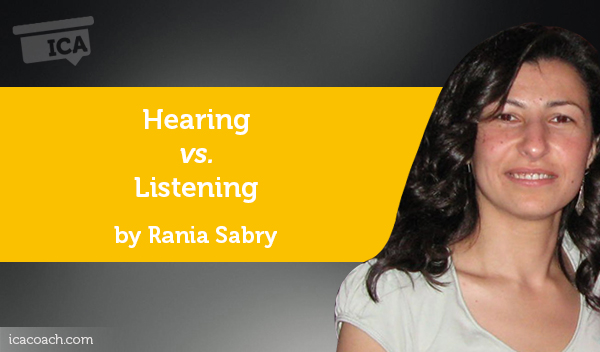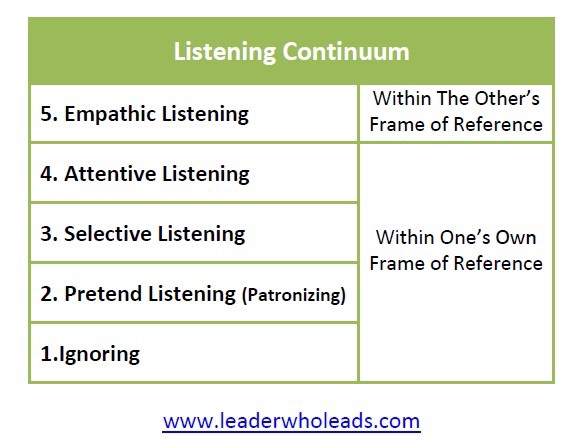
A Coaching Power Tool Created by Rania Sabry
(Life Coach, EGYPT)
Introduction:
You won’t know what your intuition is telling you unless you stop to truly listen. This is when life really happens!
Hearing is simply the act of perceiving sound by the ear. If you are not hearing-impaired, hearing simply happens. Listening, however, is something you consciously choose to do. Listening requires concentration so that your brain processes meaning from words and sentences.
Levels of Listening
Levels of Listening explores how important listening is for effective communication. As Covey emphasizes in 7 Habits of Highly Effective People, most of our efforts to develop communication skills deals with reading, writing and speaking. But very little effort is placed on developing our ability to really hear the other person’s perspective.
Levels of Listening
Stephen R. Covey’s Listening Continuum identifies five(5) levels of listening.
At the first four (4) levels, the listener hears with their own frame of reference in mind. But it is at Level 5 that true communication occurs. This is where the listener attempts to see things from the other person’s perspective or point of view, not with your own filter/ lense.
Level 1: Ignoring
If you have ever been ignored there is no doubt about it. You are talking but the other person is not giving any attention to what you are saying.
Now, it is possible the person did not hear you. If that is the case, it is not ignoring.
Level 2: Pretend Listening
To truly hear someone takes time and attention.
Pretend listeners give you the impression they hear what you say, and they may hear some of your words, but they are not “present.”
They may nod their head or offer another gesture to indicate they are listening, but they are not giving you their full attention.
Level 3: Selective Listening
The next level is selective listening. The person who listens selectively only wants part of the message, but not all. They are probably the person who says, “So, what’s your point?”
They are quick to interrupt the person who is speaking or they have the tendency to finish the other person’s sentences.
Level 4: Attentive Listening
Attentive listeners offer their time and attention. But they are one step short of being empathic listeners because attentive listeners hear from their frame of reference. They don’t try to put themselves in the other person’s shoes.

Level 5: Empathic Listening
Empathic listening is intentional. The person who develop this skill listens not only to the other person’s words, they listen for what the other person means. They are willing to give their time AND full attention to truly hear the other person.
To truly listen means to transcend your autobiography, to get out of your own frame of reference, out of your own value system, out of your own history and judging tendencies, and to get deeply into the frame of reference or viewpoint of another person. This is called empathic listening. It is a very, very rare skill. But it is more than a skill. Much more.- Stephen R. Covey, The 8th Habit
Self Application
The more curious with the client story you are, the more focused you get. The more focused on the client story you are, the more curious you get. The more curious and focused you are, the easier you can get all the intentions and meanings the client wanted to convey while telling their story, hence being an Empathic Listener.
One amazing sentence that never seize to impress me whenever I hear it during the Coaching classes is “Dance with the client”. The more you are able to master that duet with he client, the better you will be able to help the client in the coaching objective, as this means that you developed a clear understanding of their moves, patterns, desires, intentions and priorities in life.
Coaching Application
What Coaching do is improve the conversation for you to listen to the important talks and conversations you have with people and with yourself. No one else knows what will make you happy and bring your life in balance other than yourself. And no other way than listening to yourself will work. When you listen to yourself you make decisions that are right for you. Listening to yourself allows you to Know yourself, Listen to yourself to enable yourself to Be Happy.
Know Yourself
If you know who you are, what your values are, what your interests are and how you feel about things in life then you can hear your inner voice. A lot of times we don’t know ourselves completely because we are always spending time hearing not listening.
Are you mindful of your own habits?
Help the client to Become mindful: Make it a habit to think about everything you do throughout the day. How does it make you feel? Why are you doing it? What are the results of every action?
Are you having life that allows you to understand your real desires?
Help the client to understand how to Live spontaneously and enjoy life more:
Following a certain route in life does not give you any opportunity to listen to yourself. When you feel like doing something, go ahead and do it! Everything must be done in moderation and I am not asking you to quit your job if you get mad at your boss. But:
Do you try out new things/ unexpected?
Trying out new things/unexpected things at least once a week and you will become more relaxed about life and you will know your inner self better.
How do you take care of yourself?
If you don’t take care of yourself then you’lI lose part of yourself. In order to know yourself you must spend some time regularly doing what you love. If you do what you like then you know how it feels to be calm, relaxed and balanced. This is the feeling you are looking for when you try to listen to yourself.
What are your core beliefs?
Find your core belief. Your core belief is the belief that keeps you afloat in any life storm and that lets you walk through life confidently and steadily. If you know what your core belief is then you can turn to this belief when you need to listen to yourself.
Listen to Yourself
Once you know yourself it is time to Listen to yourself. Your inner voice, intuition, sixth sense, subconscious mind can guide you through life and help you make the right decisions. It does not mean that you will not make mistakes but those mistakes will teach you something too in life.
What is the normal day-to-day distractions that take most of your day?
Free your mind. Today we are constantly surrounded by information that often clutters our mind. TV shows, Facebook, Twitter, opinions of people around you, news, blogs and more… You need to have some clear room in your mind that will let you listen to yourself and not voices of other people.
What do you do if you want to focus with yourself?
A special place for instance, it might be your back porch, shower, beach, park, art gallery, coffee shop or any other place. A thing you do, draw, run, swim, meditate or maybe cooking even. Anything that make you feel calm and connected to your inner self and to your core and dive into your thoughts and let them flow through you. Listen to what your inner self is telling you at that moment.
What are the questions that you want to ask yourself?
Before you can hear anything you often have to ask questions. The most powerful questions are: How do I feel about it? keep on going with what’s, where’s and when’s. Keep asking yourself different questions until you feel that you have found the right answer.
Who is talking? Where is this coming from?
You will need to identify the decisions that you are making whether they are based on emotions or inner voice. When you learn to be mindful and patient you discover the difference between emotions and inner voice.
I believe that the world is always sending us messages, prompts, advice, hints, or whatever we need to steer us in the direction of our heart’s desire.
While I believe the universe sends us signs to help us grow and flourish, you could also see it it as your higher self—an inner knowing that helps you hear and follow your heart’s calling.
References:
http://www.leaderwholeads.com/levels-of-listening.html